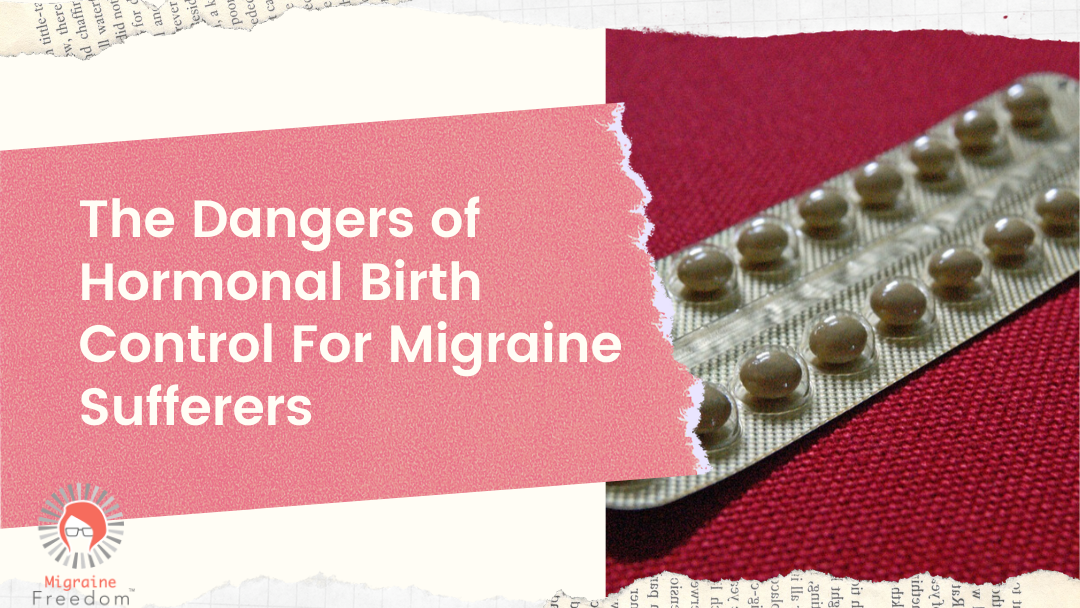You may (hopefully!!!) be aware that migraines with aura and hormonal birth control don’t mix, but did you know the dangers of hormonal birth control for migraine sufferers extend beyond the increased risk of stroke?
Migraines With Aura
More than 25% of migraineurs experience migraine with the visual and other neurological disturbances preceding the headache phase called an aura.
Migraines with aura and the estrogen found in many hormonal birth control forms create a compound risk for strokes caused by blood clots.
The World Health Organization reported a higher risk of stroke associated with the estrogen in birth control generally in 1996 and a large study on women’s health found that women under 45 who suffer with migraines with aura also have a relatively elevated risk of stroke for their age.
Extra estrogen, migraines with aura (and smoking) all increase the odds of developing a blood clot and having multiple risk factors may lead your doctor to recommend a different form of birth control.
If you get migraines, and especially migraines with aura, make sure to discuss this with the doctor who is prescribing your birth control so that they factor in all of your risks.
What other risks are there besides blood clots?
As Dr. Jolene Brighton discusses with me in the video below, hormonal birth control depletes magnesium, zinc, B-vitamins, key antioxidants such as vitamin C, selenium and vitamin E.
Long term use also wrecks havoc on gut health.
Nutrient deficiencies and poor gut health have insidious consequences for our long term health – though perhaps not as obvious and immediate as a stroke.
Theses issues can make our migraines worse over time, lead to fatigue, brain fog, anxiety and depression and chronic pain.
“But getting off the pill is going to be a disaster”
The most common conversation I have with women is actually when they already know that synthetic hormones aren’t healthy for them anymore and they want to stop taking it but they are scared because they had so many issues with hormone symptoms before starting the pill and also have heard the horror stories about hormones swinging all over the place when you stop.
I get it…I was in this position myself and resisted for almost two years of my doctor telling me I needed to stop.
It’s convenient to have control over your cycle and in my mind being on it was playing a big role in controlling my migraines (turns out it made zero impact when I stopped).
There are two things you should know:
- The hormonal symptoms you had before the pill (migraines, PMS, acne, whatever) were not due to a fundamental deficiency of synthetic hormones. There are other imbalances that deserve to be addressed at the root cause (gut health, detox, etc). If the were there before you started the pill and haven’t been addressed yet – all the more reason to start working on those things asap instead of continuing to mask the problems.
- There are ways to smooth the process of coming off of hormonal birth control and also improve your whole-body health at the same time.
So how do I stop hormonal birth control without getting back on an endless hormonal roller coaster?
The FIRST thing you should do is read Dr. Jolene Brighton’s book Beyond the Pill. It’s not simply a book that is trying to talk you out of using hormonal birth control- more importantly it is a guide to how to go about doing that in the gentlest and most supportive way possible.
 Her writing is enlightening and entertaining at the same time. It makes you want to keep reading in a way very few health books do and you’ll walk away with a new appreciation for the purpose and rhythm of female hormones.
Her writing is enlightening and entertaining at the same time. It makes you want to keep reading in a way very few health books do and you’ll walk away with a new appreciation for the purpose and rhythm of female hormones.
The book came out this past January and has become my go-to recommendation for anyone wanting to balance their hormones naturally. (And by the way, it is relevant for all forms of hormonal birth control, not just the pill.)
You know how sometimes you don’t want to lend out your favorite book, because you may never get it back, but you really want someone to read it so you give it to them anyway? Yea that happened…so I’m ordering a new copy on Kindle right now, which is what reminded me to tell you about this!
At some point you may want to invest in functional lab testing and work with someone who can guide you through the process, but the first step is to get some context and perspective and educate yourself on the risks and alternatives so that you can have an informed discussion with your healthcare provider.
Leave a comment!
Have you been putting off this transition? What’s your biggest fear?




ugh. what is it about those darn hormones? have you tried botox? I haven’t but i’ve heard it works well.
Joy at The Joyous Living
Botox seems to have mixed results for different migrainers. Glad it works well for you.
This book sounds like it could help so many women. Not all of us want to be on the pill for migraines or even for birth control. Instead, we’re on it for our cycles.
Agreed. A lot of us prefer to balance hormone naturally.
Very interesting article.I have shared this article with a few friends who I think would appreciate it. Thanks
Thank you for passing this post along.
Wow, I wasn’t aware of this book. My best friend suffers from migraines and is taking the pill. Will share this book information with her! Many prefer to NOT be on the pill for sure.
Thanks for passing this book and post along to your friend.
I had no idea that birth control could cause any dangers for migraine sufferers. I’m so glad I quit the pills last year, it’s made my life more enjoyable and healthier!
thanks for sharing this post. my friend suffers from this so ill forward this on to her.
Thanks for sharing this post with your friend, Emily.
This is some really interesting information. Definitely sounds like a great book.
This is such a useful post! Thank you for sharing! I had no idea of the increased risk of stroke, but still, I´m not happy with taking pills for a while! Will definitely check out the book!
The book is really good and I highly recommend it.
I’ve been off birth control for years , there’s so much that that those pills can cause in the body. Thanks for sharing this and informing other defect it can have.